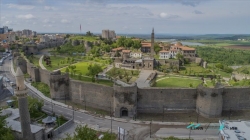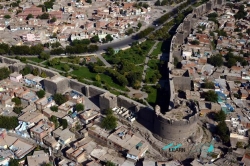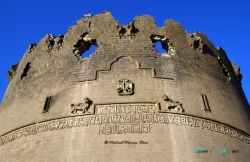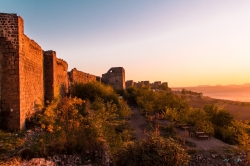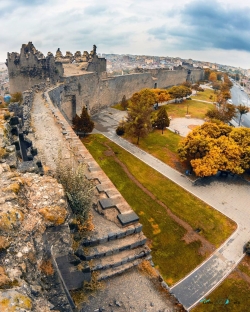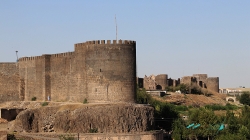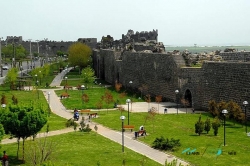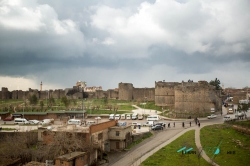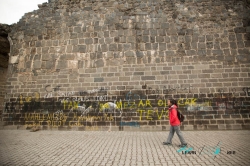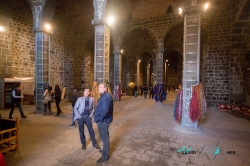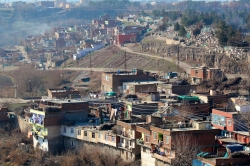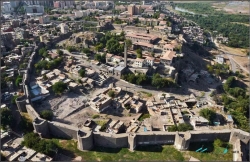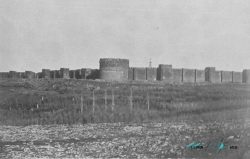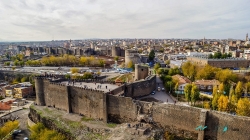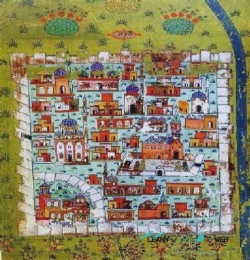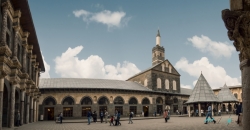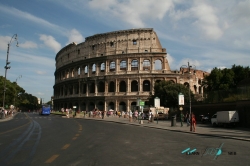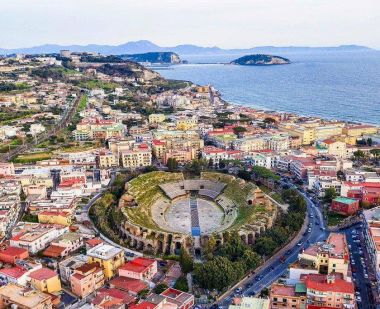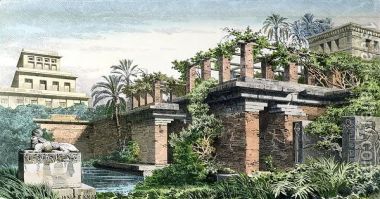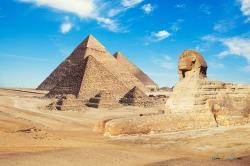ABOUT Diyarbakır Fortress
Diyarbakır Fortress, or Diyarbakır Walls, is a historic marvel in Turkey located in the Sur district of Diyarbakır. This impressive structure, recognized as a UNESCO World Heritage Site since 2015, dates back approximately 9,000 years, making it one of the oldest and longest defense walls in the world, second only to the Great Wall of China. The fortress is divided into two main sections: the Inner Fortress (İç Kale) and the Outer Fortress (Dış Kale), and it showcases a rich blend of architectural styles and historical influences.
The Inner Fortress is believed to be the oldest part and was likely the city's initial settlement. Later, in the 9th century BCE, the Bit-Zamani tribe restored parts of the structure, establishing Diyarbakır as their capital. This continuous occupation and renovation by various civilizations have made Diyarbakır Fortress a valuable testament to ancient defense architecture and city planning.
Constructed using basalt from the nearby Karacadağ volcano, the fortress's design is adapted to its surrounding landscape. The walls stand at 10-12 meters in height and span 3-5 meters in width, extending approximately 5 kilometers around the city. The fortress includes 82 towers with varied architectural designs: some are semicircular or polygonal, while others facing the Tigris River are rectangular.
These towers, connected by intricate staircases, feature multiple levels capped with domes, arches, and vaults. The fortress also contains stunning decorative reliefs of animals and symbolic figures. Notably, the Seven Brothers Tower (Yedi Kardeş Burcu), constructed during the Artuqid dynasty, showcases intricate carvings of eagles, lions, and other figures symbolizing power.
Other notable towers include the Evli Beden Tower (Benusen Tower), built in 1208 by the Artuqid Sultan Melik Salih, adorned with inscriptions and geometric designs. The Nur Tower, completed by the Seljuk Sultan Malik Shah in 1089, features impressive animal and human reliefs, reflecting the Seljuk artistic influence.
Diyarbakır Fortress is accessed through four major gates, each with distinct historical significance:
Dağ Gate (Harput Gate) served as an entrance point on the northern side, flanked by two cylindrical towers.
Mardin Gate lies on the southern side, providing access to key trade routes.
Urfa Gate in the west bears inscriptions and was restored by Artuqid Sultan Mehmet, featuring iron doors with human and animal engravings.
Yeni Gate (Water Gate) in the east, also known as the Su Kapısı, connects the city to the Tigris River.
A Cultural and Historical Treasure
Diyarbakır Fortress, with its monumental size and historical depth, offers a unique look into the cultural heritage of the region. From its ancient origins to its modern-day status as a UNESCO World Heritage Site, Diyarbakır Fortress stands as a testament to Turkey's rich and diverse history.
Diyarbakır Fortress has faced multiple challenges in recent history, including significant damage from the 2023 Kahramanmaraş earthquakes. Additionally, the 2015-2016 Sur conflicts saw the fortress suffer structural damage. Several parts of the fortress, including prominent towers like Yenikapı and Keçi Burcu, were damaged, and temporary installations affected the structural integrity of the site.
Diyarbakır Fortress, Rich Historical Legacy
The Fortress has a storied past, with archaeological evidence suggesting that it was first built by the Hurrians around 2,000 BCE. The fortress underwent various restorations and expansions, particularly during the Roman Empire in the 4th century CE, when notable modifications were made to strengthen its defensive capabilities.The Inner Fortress is believed to be the oldest part and was likely the city's initial settlement. Later, in the 9th century BCE, the Bit-Zamani tribe restored parts of the structure, establishing Diyarbakır as their capital. This continuous occupation and renovation by various civilizations have made Diyarbakır Fortress a valuable testament to ancient defense architecture and city planning.
Constructed using basalt from the nearby Karacadağ volcano, the fortress's design is adapted to its surrounding landscape. The walls stand at 10-12 meters in height and span 3-5 meters in width, extending approximately 5 kilometers around the city. The fortress includes 82 towers with varied architectural designs: some are semicircular or polygonal, while others facing the Tigris River are rectangular.
These towers, connected by intricate staircases, feature multiple levels capped with domes, arches, and vaults. The fortress also contains stunning decorative reliefs of animals and symbolic figures. Notably, the Seven Brothers Tower (Yedi Kardeş Burcu), constructed during the Artuqid dynasty, showcases intricate carvings of eagles, lions, and other figures symbolizing power.
Towers of Diyarbakır Fortress
One of the most iconic towers, Keçi Burcu, is among the largest and oldest, originally used as a religious temple during the Byzantine period. With three naves and impressive brick vaults, this tower is structurally unique compared to other fortress towers.Other notable towers include the Evli Beden Tower (Benusen Tower), built in 1208 by the Artuqid Sultan Melik Salih, adorned with inscriptions and geometric designs. The Nur Tower, completed by the Seljuk Sultan Malik Shah in 1089, features impressive animal and human reliefs, reflecting the Seljuk artistic influence.
Diyarbakır Fortress is accessed through four major gates, each with distinct historical significance:
Dağ Gate (Harput Gate) served as an entrance point on the northern side, flanked by two cylindrical towers.
Mardin Gate lies on the southern side, providing access to key trade routes.
Urfa Gate in the west bears inscriptions and was restored by Artuqid Sultan Mehmet, featuring iron doors with human and animal engravings.
Yeni Gate (Water Gate) in the east, also known as the Su Kapısı, connects the city to the Tigris River.
A Cultural and Historical Treasure
Diyarbakır Fortress, with its monumental size and historical depth, offers a unique look into the cultural heritage of the region. From its ancient origins to its modern-day status as a UNESCO World Heritage Site, Diyarbakır Fortress stands as a testament to Turkey's rich and diverse history.
Diyarbakır Fortress has faced multiple challenges in recent history, including significant damage from the 2023 Kahramanmaraş earthquakes. Additionally, the 2015-2016 Sur conflicts saw the fortress suffer structural damage. Several parts of the fortress, including prominent towers like Yenikapı and Keçi Burcu, were damaged, and temporary installations affected the structural integrity of the site.
The Best Pictures of Diyarbakır Fortress
Videos of Diyarbakır Fortress







